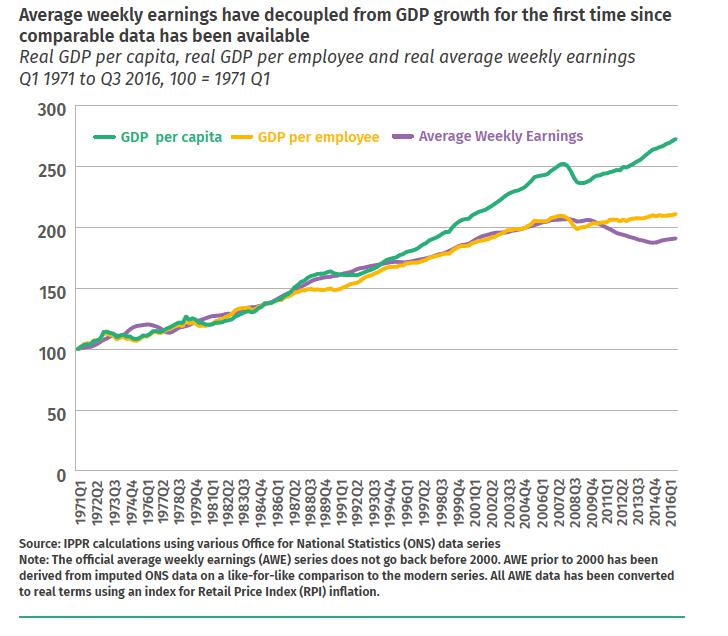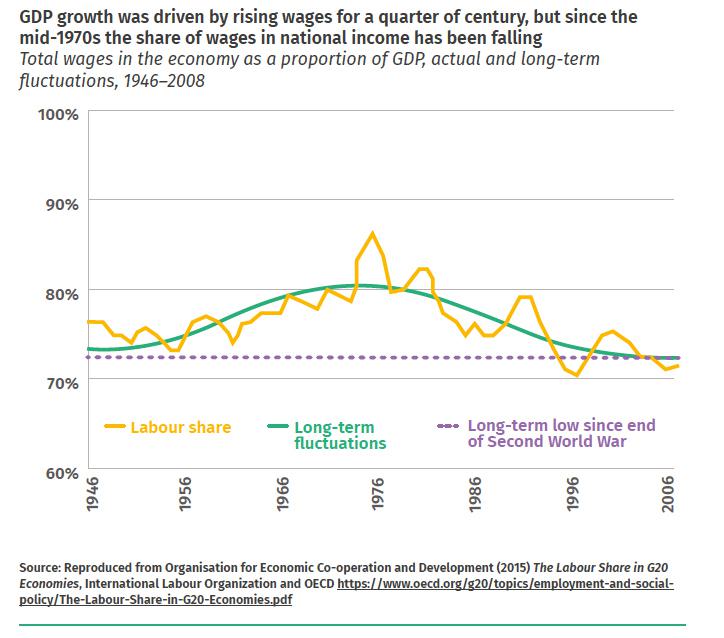Economic growth no longer leading to rising earnings, finds IPPR Commission on Economic Justice
6 Sept 2017Press Story
The UK economy no longer translates economic growth into rising earnings, finds a new report published today. Gains from growth have gone largely into profits rather than wages, and the UK economy is now in the longest period of earnings stagnation for 150 years.
The Interim Report of the IPPR Commission on Economic Justice - whose members include the Archbishop of Canterbury and leading figures from business and civil society - proposes ‘fundamental reform’ of the British economy on a scale comparable with the Atlee reforms of the 1940s and the Thatcher revolution of the 1980s.
The Commission is calling for an urgent public debate on taxation, the role of the financial sector, the power of trade unions and the market dominance of digital companies such as Amazon, Facebook and Google.
Archbishop of Canterbury, the Rt Rev Justin Welby, said:
“Our economic model is broken. Britain stands at a watershed moment where we need to make fundamental choices about the sort of economy we need. We are failing those who will grow up into a world where the gap between the richest and poorest parts of the country is significant and destabilising.”
The report sets out new analysis which shows that, though GDP per head has risen by 12% since 2010, average earnings per employee have fallen by 6%. Since the 1970s the share of national income which has gone to wages has gradually declined, from 80% to 73%, while the share going to profits has increased. The wage share is now the lowest it has been since the second world war.
Overall, the report’s analysis finds that the economy is no longer raising living standards for a majority of the population, breaking the ‘economic promise’ that has underpinned public life since the second world war. The economy’s deep weaknesses make it unfit to face the challenges of the 2020s:
- The UK is experiencing the longest period of earnings stagnation for 150 years, and young people today are set to be poorer than their parents
- The UK is the most geographically unbalanced economy in Europe, with 40% of output produced in London and the South East and average incomes in the North West, South West, West Midlands and Wales now more than 30% lower than in London
- The labour market is increasingly casualised, with more workers on low pay than 10 years ago, 3% of the workforce on zero hours contracts and more employees overqualified for their jobs than anywhere else in the EU
- The UK is the most unequal of western European countries, with nearly a third of children living in poverty. More of the poor now live in working households (54%) than in non-working households (46%)
- UK productivity is 13% below the average for the richest G7 countries, around 20% below France and Germany, and has stalled since 2008
- UK public and private investment is around 5 per cent of GDP below the OECD average. At 8%, corporate investment is below the rate of depreciation, meaning that the stock of business capital is actually falling.
- The UK has the largest current account deficit (as a percentage of GDP) of all the G7 countries
- The UK has a growing ‘fiscal gap’ between tax revenues and expenditure, which is set to worsen as the population ages and the proportion of workers declines
- Growing automation is unlikely to cause mass unemployment, but could make inequality worse unless the gains are recirculated in the economy
The report calls for public debate on a range of reforms, including:
- A fairer and simpler tax system, that incentivises economic ‘goods’ like investment and employment and dis-incentivises ‘bads’ like pollution and property prices. It suggests that taxes could be ‘hypothecated’ or earmarked for health and social care.
- A better distribution of wealth, potentially through new taxes and a sovereign wealth fund to better distribute national wealth
- Much greater economic power for the UK’s nations and regions, including greater ‘fiscal devolution’ and regional banks to support local economies
- Stronger trade unions, to help raise wages and protect workers in the ‘gig economy’
- Better regulation and taxation of monopoly digital companies to ensure that data created by consumers is used for public benefit and supports widespread innovation
Tom Kibasi, IPPR Director and Chair of the Commission on Economic Justice, said:
“The British economy needs fundamental reform. We don’t have a British economic model. We have an economic muddle. The persistent economic problems we have experienced since the 2008 financial crash won’t be fixed with a bit of tinkering. There is a growing consensus across business, trade unions and civil society that a radical new approach is now needed. Change should be guided by a new vision for the economy, where long-term prosperity is joined with justice for all. We want to see the widest public debate possible on our analysis and proposals.”
Ends
Contact:
Sofie Jenkinson, 07981023031, s.jenkinson@ippr.org
Ella White, 07788666212, e.white@ippr.org
Notes to Editors:
1. Members of the IPPR Commission on Economic Justice are:
- Dominic Barton, Global Managing Partner, McKinsey and Company
- Sara Bryson, Community Organiser, Tyne & Wear Citizens, Citizens UK
- Matthew Clifford MBE, Co-founder and CEO, Entrepreneur First
- Charlie Cornish, Group Chief Executive, Manchester Airports Group Plc
- Lord John Eatwell, President, Queens’ College, University of Cambridge; Professor Emeritus, Judge Business School
- Grace Gould, Entrepreneur in Residence, LocalGlobe
- Sandra Kerr OBE, Race Equality Director, Business in the Community
- Lord Bob Kerslake, Chair of London’s King’s College Hospital NHS Foundation Trust; former Head of the Civil Service
- Tom Kibasi, Director, Institute for Public Policy Research
- Catherine McGuinness, Chairman of the City of London Corporation Policy and Resources Committee
- Juergen Maier, Chief Executive Officer, Siemens UK
- Sir Charlie Mayfield, Chairman, John Lewis Partnership
- Prof. Mariana Mazzucato, leading economist
- John Mills, Founder and Chairman, JML
- Helena Morrissey CBE, Head of Personal Investing, Legal & General Investment Management; former Chair, Investment Association; Founder, 30% Club
- Frances O’Grady, General Secretary, Trades Union Congress
- Stephen Peel, Founder, SMP Policy Innovation
- Mary Senior, Scotland Official, University and College Union
- Mustafa Suleyman, Deepmind’s Head of Applied Artificial Intelligence
- Sally Tallant, Director of the Liverpool Biennial Contemporary Art Festival
- Hetan Shah, Executive Director of the Royal Statistical Society
- Neera Tanden, President, Center for American Progress
- The Most Revd and Rt Hon Justin Welby, Archbishop of Canterbury, Church of England.
2. The following two charts from the report show (a) the ‘decoupling’ of GDP per capita and average earnings and (b) the decline in the share of national income going to wages since the 1970s.

3. The IPPR Commission on Economic Justice will publish its final report with specific policy recommendations in 2018.
4. IPPR is an independent registered charity and Britain’s leading progressive think tank. It is dedicated to the better country that Britain can be. With nearly 40 staff across four offices throughout the UK, IPPR is Britain’s only national think tank with a truly national presence. Our independent research covers the economy, work, housing, education, health, migration, energy, transport, devolution and democracy among other areas. www.ippr.org